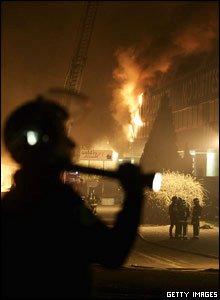
Where
AS THE night falls, the "troubles" start — and the pattern is always the same.
Bands of youths in balaclavas start by setting fire to parked cars, break shop windows with baseball bats, wreck public telephones and ransack cinemas, libraries and schools. When the police arrive on the scene, the rioters attack them with stones, knives and baseball bats.
The police respond by firing tear-gas grenades and, on occasions, blank shots in the air. Sometimes the youths fire back — with real bullets.
These scenes are not from the West Bank but from 20 French cities, mostly close to Paris, that have been plunged into a European version of the intifada that at the time of writing appears beyond control.
Why
Why have the riots happened? From many accounts one would think that the riots have been caused by France’s failure to implement Marxism. “The unrest,” AP explained, has highlighted the division between France’s big cities and their poor suburbs, with frustration simmering in the housing projects in areas marked by high unemployment, crime and poverty.” Another AP story declared flatly that the riots were over “poor conditions in Paris-area housing projects.”
Reuters agreed with AP’s attribution of all the unrest to economic injustice, and added in a suggestion of racism: “The unrest in the northern and eastern suburbs, heavily populated by North African and black African minorities, have been fuelled by frustration among youths in the area over their failure to get jobs and recognition in French society.” Deutsche Presse Agentur called the high-rise public housing in the Paris suburbs “a long-time flashpoint of unemployment, crime and other social problems.”
One might get the impression from this that France is governed by top-hatted, cigar-smoking capitalists, building their fortunes on the backs of the poor, rather than by socialists and quasi-socialists who have actually strained the economy by spending huge amounts of money on health and welfare programs. Nor does the idea that the rioting has been caused by economic inequalities explain why Catholics and others who are poor in France have not joined the Muslims who are rioting. Of course, all the news agencies have either omitted or mentioned only in passing that the rioters are Muslims at all. The casual reader would not be able to escape the impression that what is happening in France is all about economics — and race.
The areas hardest hit by the riots, according to Reuters, are “home to North African and black African minorities that feel excluded from French society.” AP shed some light on this feeling of exclusion: “the violence also cast doubt on the success of France’s model of seeking to integrate its large immigrant community — its Muslim population, at an estimated 5 million, is Western Europe’s largest — by playing down differences between ethnic groups. Rather than feeling embraced as full and equal citizens, immigrants and their French-born children complain of police harassment and of being refused jobs, housing and opportunities.”
But What about ...
It's a barely kept secret that Mr. Chirac led the opposition to the Iraq war out of fear of how his Muslim population would react. This fear is a big part of why France portrays itself as America's counterweight and why it criticizes Israel at every turn and coddled the terrorist Yasser Arafat right up to his death. This doesn't elicit thanks from Muslim radicals in France. It turns out to project an image of weakness. Unsurprisingly when faced with some unhappiness they believe they can pressure the French state into submission.
No comments:
Post a Comment